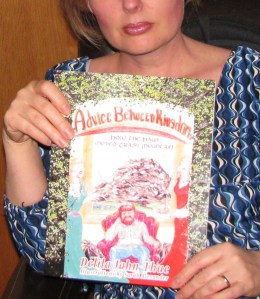By Delila Jahn-Thue
(Niagara At Large is pleased, once again, to welcome Delila Jahn-Thue from Canada’s great mid-west as a voice from another region of this continent to what we often like to think of here as an online town hall. In this column, Delila shares some her views on the perilous state of our planet and we welcome you to share yours too.)
I wake from a few hours’ sleep to accept my place in life.
Gone is my youth, during which I staggered wildly after whatever it was I was supposed to be in life, disappointed, judging myself at every turn. Gone is woeful self measuring against media models of success and failure in material terms. Now I wake nightly to burn in hell.
An Aunt recently advised: “First you throw the husband out of bed, then every blanket, cool off and go back to sleep.”
But here on the farm, following these directions wouldn’t lower Farmer’s temperature, or mine.
Besides, this means more uninterrupted reading time.
During the past few sizzling nights I’ve burned through Alanna Mitchell’s Sea Sick – The Global Ocean in Crisis. It’s a heavy club sandwich of global scientific research from her travels around the planet cataloguing Ocean vital signs.
As a child living in Saskatchewan’s Souris Valley, I examined fossils often, understanding that where I lived was once sea. Those artifacts along with arrowheads and stone tools from summer fallowed fields, reminded me that the world changes.
If I took my kids to those same fields now, we’d find a different world again. Oil and gas developments there continue to alter the planet significantly. During the past forty some years Ocean has absorbed directly related C02 induced revolutions in function, temperature, salinity and ph.
Mitchell travels to the Great Barrier Reef, which is dying out at such a rate my grand-kids won’t likely see it alive. Above-mentioned changes are killing the complex web of life that makes this nursery of the planet a vanishing ecosystem of species that will not be feeding the world.![great barrier reef]](https://niagaraatlarge.com/wp-content/uploads/2013/01/great-barrier-reef.jpg?w=300&h=228)
Overfishing and pollution are also huge factors stemming from human “devolution” that have adversely affected coral reefs globally, meaning they face extinction long before scientists understand most of the life cycles within them.
Mitchell calls the reef “an engine of evolution” and “a biological gold mine that is even more productive than tropical rain forests, arguably the most important part of the most important medium of life on the planet.”
It’s hard to hear that our Ocean is dying (5 times faster than rain forests). Fish are over-harvested, water acidified, becoming void of aquatic life in about 407 dead zones.
C02 emissions are rising at alarming rates and Ocean, our greatest carbon absorber, has nearly absorbed all the C02 as she can take.
Mitchell concludes: “the time to act is right now.”
Several things (besides erratic, destructive climate change) happen as C02 levels rise in the atmosphere (now at 387 parts per million). One change is temperatures rise. As Ocean heats, plankton feeding on Oceans’ creatures and producing half the world’s oxygen, are affected. When C02 levels reach 450, Mitchell reports, Scientists estimate that one quarter of all living things will be extinct (probably by mid century).
At 550 p.p.m. C02 “we will have caused the genetic extermination of up to 70 per cent of living things” (C02 producing humans included). “That level of extinction has happened only five times before in the planet’s history.” Remember the dinosaurs?
Instinctively we know we’re in trouble. Protesting extinction, Canadian protestors are currently lighting fires of change under our politicians.
Realistically, we could be up all night working on building an economic system that supports life by reducing our C02 levels http://www.cbc.ca/m/touch/news/story/2013/01/09/pol-oil-gas-industry-letter-to-government-on-environmental-laws.html . Other industrialized countries are rapidly reducing their C02 by developing renewable energies. Canada increases C02 production instead.
Lighting fires (protesting) to kick start this work and promote our survival now falls to the sleepy electorate. That’s (yawn) us.
Presently, Ocean vitals indicate plankton aren’t up to helping us.
Delila Jahn-Thue is a teacher, columnist: Living from The Farm and author of Advice Between Kingdoms – How the Hays Moved Trash Mountain (Balboa Press 2012).
She is involved in ecological causes including farmers’ rights, water quality and creating rural recycling opportunities. Passionate about the land, Delila travels to communities and schools sharing awareness of how our daily actions affect the land that feeds us.
We encourage you to visit Delila’s website at Livingfromthefarm.com .
(Niagara At Large invites you to share your views on this commentary. Remember that NAL only posts comments from individuals who share their first and last name with them. Thank you.)
